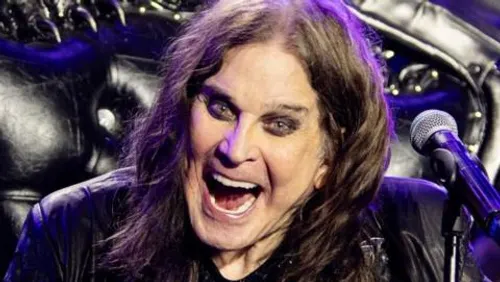John Michael “Ozzy” Osbourne, the indelible godfather of heavy metal and one of the most enduring and electrifying performers in rock history, passed away in 2025 at the age of 76. Born December 3, 1948, in the working-class Aston district of Birmingham, England, Ozzy rose from poverty and hardship to become a legend—a voice, a symbol, a survivor.
As the original frontman of Black Sabbath, Ozzy helped invent heavy metal in the early 1970s, giving voice to a generation’s disillusionment with tracks like Paranoid, Black Sabbath, and Iron Man. His eerie, unearthly vocals and theatrical stage presence gave Sabbath an unmistakable edge. They weren’t just a band; they were a seismic shift in music, influencing thousands of artists from Metallica to Marilyn Manson and cementing heavy metal as a global force.
After being dismissed from Sabbath in 1979, many assumed his star would fade. Instead, Ozzy redefined himself as a solo artist, releasing seminal albums like Blizzard of Ozz and Diary of a Madman, packed with dark anthems and virtuoso guitar work. He not only survived—he soared. His solo career proved that his creative fire burned just as fiercely outside Sabbath, and his stage shows became legendary spectacles of excess and energy.
But the man behind the mayhem was more than just a performer. Ozzy was a devoted husband to Sharon Osbourne, his manager and partner in life for over four decades. Their relationship, while publicly tumultuous at times, was grounded in fierce love and loyalty. Together they raised three children—Aimee, Kelly, and Jack—and redefined celebrity family life with their hit MTV reality show The Osbournes, bringing a chaotic but heartfelt glimpse of rock royalty into homes around the world.
In 2020, Ozzy revealed he had been diagnosed with Parkinson’s disease, more specifically a form of Parkinsonism that severely impacted his mobility and energy. For a man whose life was built on stage adrenaline and movement, it was a brutal blow. In the years that followed, Ozzy faced a series of health setbacks and underwent multiple surgeries. But in true Osbourne fashion, he refused to give up. Each time he was knocked down, he fought to get back up—with characteristic humour, humility, and defiance.
Even as his body weakened, Ozzy’s spirit never did. He continued to record music, make public appearances, and dream of returning to the stage. And in what would become a poignant finale, Ozzy gave his last public performance just weeks before his passing, delivering an emotional farewell at a surprise appearance that left fans in awe and tears. Though visibly frail, his voice still carried the same haunting force that once shook arenas, proving he remained a titan to the very end.
Ozzy’s life was one of contradictions: the darkness of addiction and pain, and the light of family, redemption, and music. He was a man who lived loudly, laughed often, and loved deeply. He wore his scars with pride and shared them with his fans, giving voice to the voiceless and courage to the broken.
His legacy is not just in records sold or tours completed. It’s in every rebellious riff, every teenage scream, every fan who found strength in his survival. Ozzy Osbourne didn’t just help create heavy metal—he gave it a soul.
Rest easy, Ozzy. The curtain may fall, but the echoes will never fade.










